Comprehensive Report on English Law: Key Principles and Practices
VerifiedAdded on 2020/12/24
|10
|2755
|267
Report
AI Summary
This report provides a detailed overview of English law, starting with the four primary sources of law in the UK: Acts of Parliament, European Union legislation, delegated legislation, and case law. It examines the role of Parliament in lawmaking, including the stages a bill goes through to become an Act. The report also discusses the separation of powers between Parliament and the Judiciary. Furthermore, it delves into delegated legislation, outlining its three types and the controls in place. The report then explores human rights in the UK, focusing on the rights and freedoms guaranteed by the Human Rights Act 1998, and the institutions that safeguard these rights. Finally, it analyzes statutory interpretation, explaining the main rules (literal, golden, and mischief) and their application in legal practice. The report concludes by summarizing the key concepts discussed throughout the analysis.

Understanding English Law
Paraphrase This Document
Need a fresh take? Get an instant paraphrase of this document with our AI Paraphraser
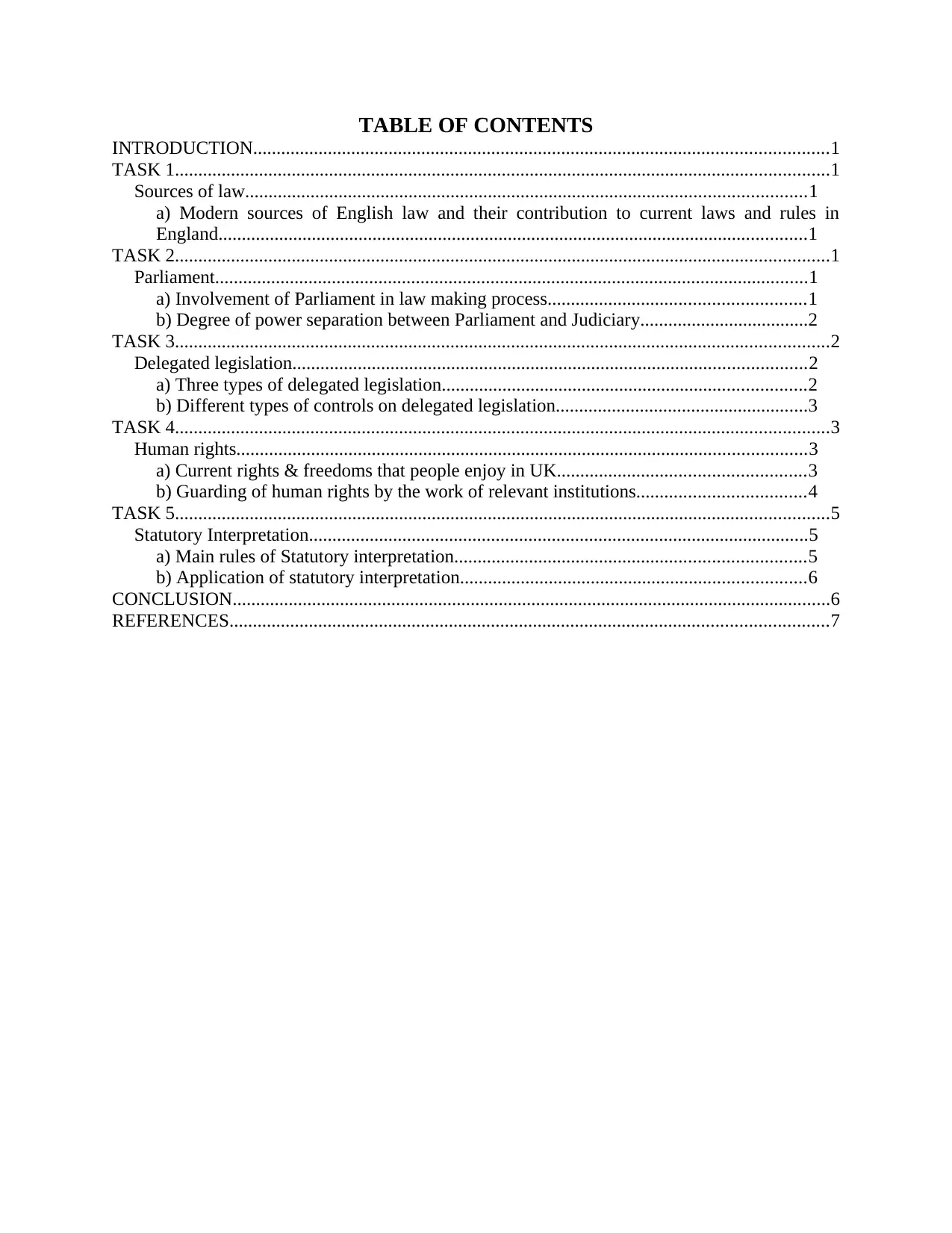
TABLE OF CONTENTS
INTRODUCTION...........................................................................................................................1
TASK 1............................................................................................................................................1
Sources of law........................................................................................................................1
a) Modern sources of English law and their contribution to current laws and rules in
England..............................................................................................................................1
TASK 2............................................................................................................................................1
Parliament...............................................................................................................................1
a) Involvement of Parliament in law making process.......................................................1
b) Degree of power separation between Parliament and Judiciary....................................2
TASK 3............................................................................................................................................2
Delegated legislation..............................................................................................................2
a) Three types of delegated legislation..............................................................................2
b) Different types of controls on delegated legislation......................................................3
TASK 4............................................................................................................................................3
Human rights..........................................................................................................................3
a) Current rights & freedoms that people enjoy in UK.....................................................3
b) Guarding of human rights by the work of relevant institutions....................................4
TASK 5............................................................................................................................................5
Statutory Interpretation...........................................................................................................5
a) Main rules of Statutory interpretation...........................................................................5
b) Application of statutory interpretation..........................................................................6
CONCLUSION................................................................................................................................6
REFERENCES................................................................................................................................7
INTRODUCTION...........................................................................................................................1
TASK 1............................................................................................................................................1
Sources of law........................................................................................................................1
a) Modern sources of English law and their contribution to current laws and rules in
England..............................................................................................................................1
TASK 2............................................................................................................................................1
Parliament...............................................................................................................................1
a) Involvement of Parliament in law making process.......................................................1
b) Degree of power separation between Parliament and Judiciary....................................2
TASK 3............................................................................................................................................2
Delegated legislation..............................................................................................................2
a) Three types of delegated legislation..............................................................................2
b) Different types of controls on delegated legislation......................................................3
TASK 4............................................................................................................................................3
Human rights..........................................................................................................................3
a) Current rights & freedoms that people enjoy in UK.....................................................3
b) Guarding of human rights by the work of relevant institutions....................................4
TASK 5............................................................................................................................................5
Statutory Interpretation...........................................................................................................5
a) Main rules of Statutory interpretation...........................................................................5
b) Application of statutory interpretation..........................................................................6
CONCLUSION................................................................................................................................6
REFERENCES................................................................................................................................7
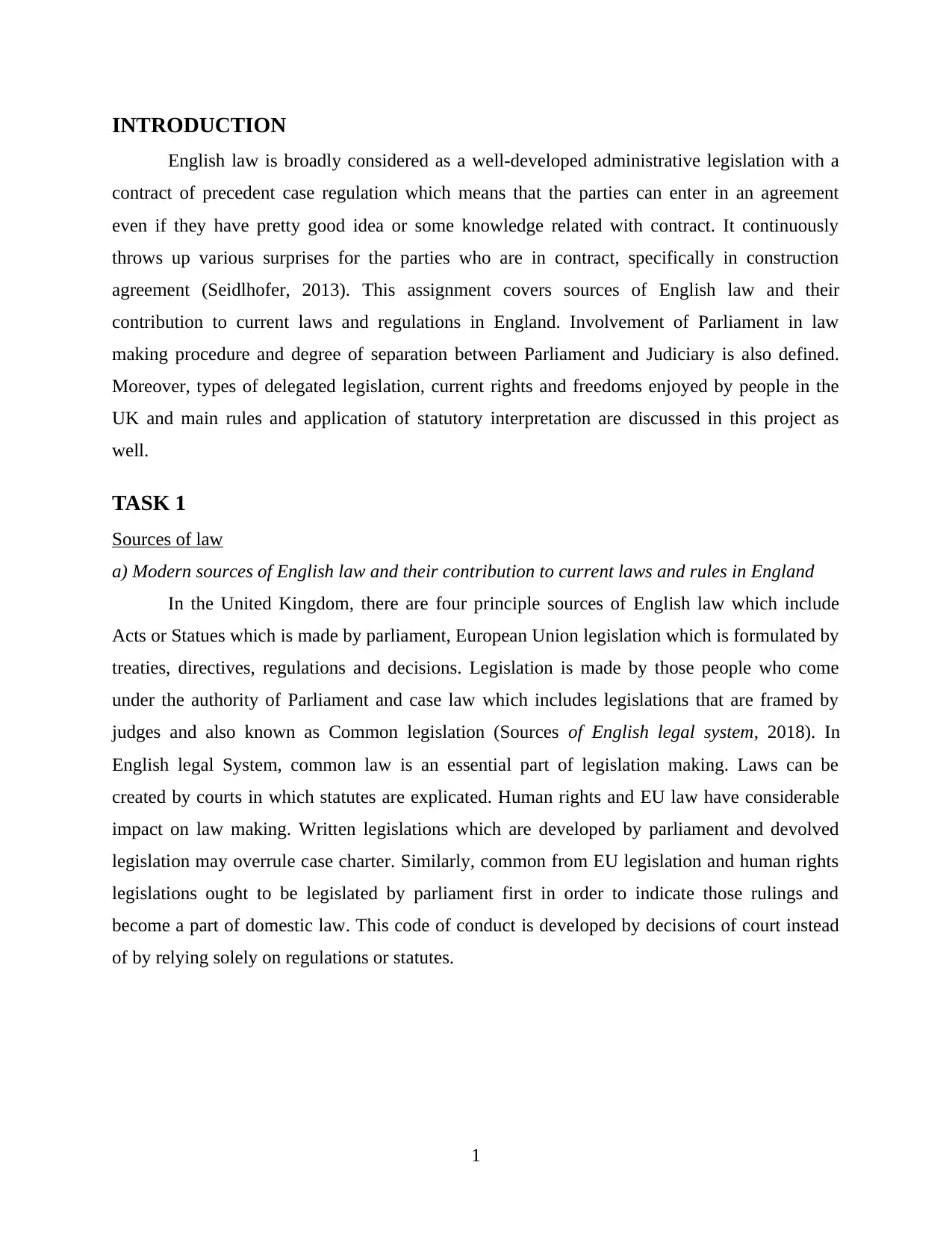
INTRODUCTION
English law is broadly considered as a well-developed administrative legislation with a
contract of precedent case regulation which means that the parties can enter in an agreement
even if they have pretty good idea or some knowledge related with contract. It continuously
throws up various surprises for the parties who are in contract, specifically in construction
agreement (Seidlhofer, 2013). This assignment covers sources of English law and their
contribution to current laws and regulations in England. Involvement of Parliament in law
making procedure and degree of separation between Parliament and Judiciary is also defined.
Moreover, types of delegated legislation, current rights and freedoms enjoyed by people in the
UK and main rules and application of statutory interpretation are discussed in this project as
well.
TASK 1
Sources of law
a) Modern sources of English law and their contribution to current laws and rules in England
In the United Kingdom, there are four principle sources of English law which include
Acts or Statues which is made by parliament, European Union legislation which is formulated by
treaties, directives, regulations and decisions. Legislation is made by those people who come
under the authority of Parliament and case law which includes legislations that are framed by
judges and also known as Common legislation (Sources of English legal system, 2018). In
English legal System, common law is an essential part of legislation making. Laws can be
created by courts in which statutes are explicated. Human rights and EU law have considerable
impact on law making. Written legislations which are developed by parliament and devolved
legislation may overrule case charter. Similarly, common from EU legislation and human rights
legislations ought to be legislated by parliament first in order to indicate those rulings and
become a part of domestic law. This code of conduct is developed by decisions of court instead
of by relying solely on regulations or statutes.
1
English law is broadly considered as a well-developed administrative legislation with a
contract of precedent case regulation which means that the parties can enter in an agreement
even if they have pretty good idea or some knowledge related with contract. It continuously
throws up various surprises for the parties who are in contract, specifically in construction
agreement (Seidlhofer, 2013). This assignment covers sources of English law and their
contribution to current laws and regulations in England. Involvement of Parliament in law
making procedure and degree of separation between Parliament and Judiciary is also defined.
Moreover, types of delegated legislation, current rights and freedoms enjoyed by people in the
UK and main rules and application of statutory interpretation are discussed in this project as
well.
TASK 1
Sources of law
a) Modern sources of English law and their contribution to current laws and rules in England
In the United Kingdom, there are four principle sources of English law which include
Acts or Statues which is made by parliament, European Union legislation which is formulated by
treaties, directives, regulations and decisions. Legislation is made by those people who come
under the authority of Parliament and case law which includes legislations that are framed by
judges and also known as Common legislation (Sources of English legal system, 2018). In
English legal System, common law is an essential part of legislation making. Laws can be
created by courts in which statutes are explicated. Human rights and EU law have considerable
impact on law making. Written legislations which are developed by parliament and devolved
legislation may overrule case charter. Similarly, common from EU legislation and human rights
legislations ought to be legislated by parliament first in order to indicate those rulings and
become a part of domestic law. This code of conduct is developed by decisions of court instead
of by relying solely on regulations or statutes.
1
⊘ This is a preview!⊘
Do you want full access?
Subscribe today to unlock all pages.

Trusted by 1+ million students worldwide
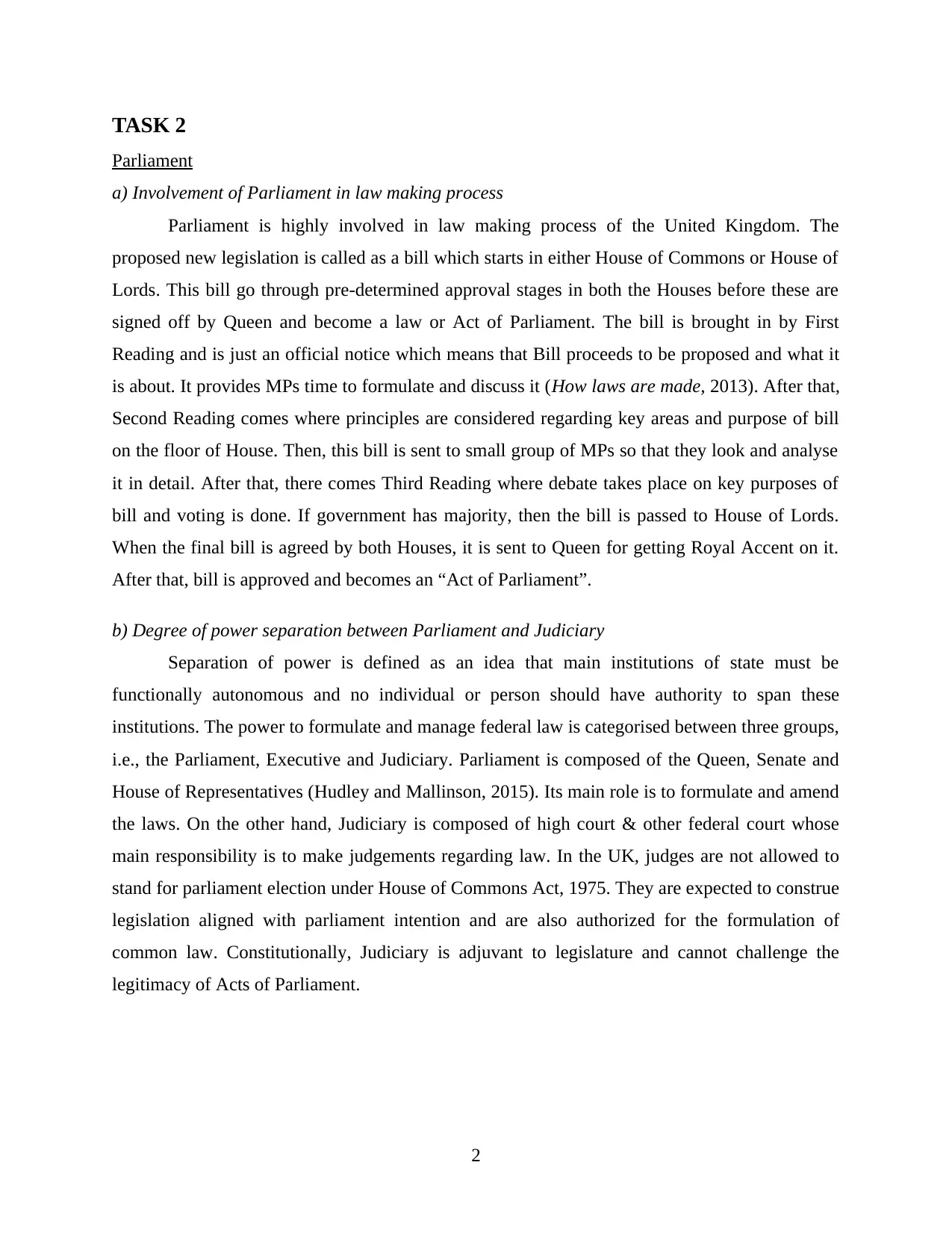
TASK 2
Parliament
a) Involvement of Parliament in law making process
Parliament is highly involved in law making process of the United Kingdom. The
proposed new legislation is called as a bill which starts in either House of Commons or House of
Lords. This bill go through pre-determined approval stages in both the Houses before these are
signed off by Queen and become a law or Act of Parliament. The bill is brought in by First
Reading and is just an official notice which means that Bill proceeds to be proposed and what it
is about. It provides MPs time to formulate and discuss it (How laws are made, 2013). After that,
Second Reading comes where principles are considered regarding key areas and purpose of bill
on the floor of House. Then, this bill is sent to small group of MPs so that they look and analyse
it in detail. After that, there comes Third Reading where debate takes place on key purposes of
bill and voting is done. If government has majority, then the bill is passed to House of Lords.
When the final bill is agreed by both Houses, it is sent to Queen for getting Royal Accent on it.
After that, bill is approved and becomes an “Act of Parliament”.
b) Degree of power separation between Parliament and Judiciary
Separation of power is defined as an idea that main institutions of state must be
functionally autonomous and no individual or person should have authority to span these
institutions. The power to formulate and manage federal law is categorised between three groups,
i.e., the Parliament, Executive and Judiciary. Parliament is composed of the Queen, Senate and
House of Representatives (Hudley and Mallinson, 2015). Its main role is to formulate and amend
the laws. On the other hand, Judiciary is composed of high court & other federal court whose
main responsibility is to make judgements regarding law. In the UK, judges are not allowed to
stand for parliament election under House of Commons Act, 1975. They are expected to construe
legislation aligned with parliament intention and are also authorized for the formulation of
common law. Constitutionally, Judiciary is adjuvant to legislature and cannot challenge the
legitimacy of Acts of Parliament.
2
Parliament
a) Involvement of Parliament in law making process
Parliament is highly involved in law making process of the United Kingdom. The
proposed new legislation is called as a bill which starts in either House of Commons or House of
Lords. This bill go through pre-determined approval stages in both the Houses before these are
signed off by Queen and become a law or Act of Parliament. The bill is brought in by First
Reading and is just an official notice which means that Bill proceeds to be proposed and what it
is about. It provides MPs time to formulate and discuss it (How laws are made, 2013). After that,
Second Reading comes where principles are considered regarding key areas and purpose of bill
on the floor of House. Then, this bill is sent to small group of MPs so that they look and analyse
it in detail. After that, there comes Third Reading where debate takes place on key purposes of
bill and voting is done. If government has majority, then the bill is passed to House of Lords.
When the final bill is agreed by both Houses, it is sent to Queen for getting Royal Accent on it.
After that, bill is approved and becomes an “Act of Parliament”.
b) Degree of power separation between Parliament and Judiciary
Separation of power is defined as an idea that main institutions of state must be
functionally autonomous and no individual or person should have authority to span these
institutions. The power to formulate and manage federal law is categorised between three groups,
i.e., the Parliament, Executive and Judiciary. Parliament is composed of the Queen, Senate and
House of Representatives (Hudley and Mallinson, 2015). Its main role is to formulate and amend
the laws. On the other hand, Judiciary is composed of high court & other federal court whose
main responsibility is to make judgements regarding law. In the UK, judges are not allowed to
stand for parliament election under House of Commons Act, 1975. They are expected to construe
legislation aligned with parliament intention and are also authorized for the formulation of
common law. Constitutionally, Judiciary is adjuvant to legislature and cannot challenge the
legitimacy of Acts of Parliament.
2
Paraphrase This Document
Need a fresh take? Get an instant paraphrase of this document with our AI Paraphraser
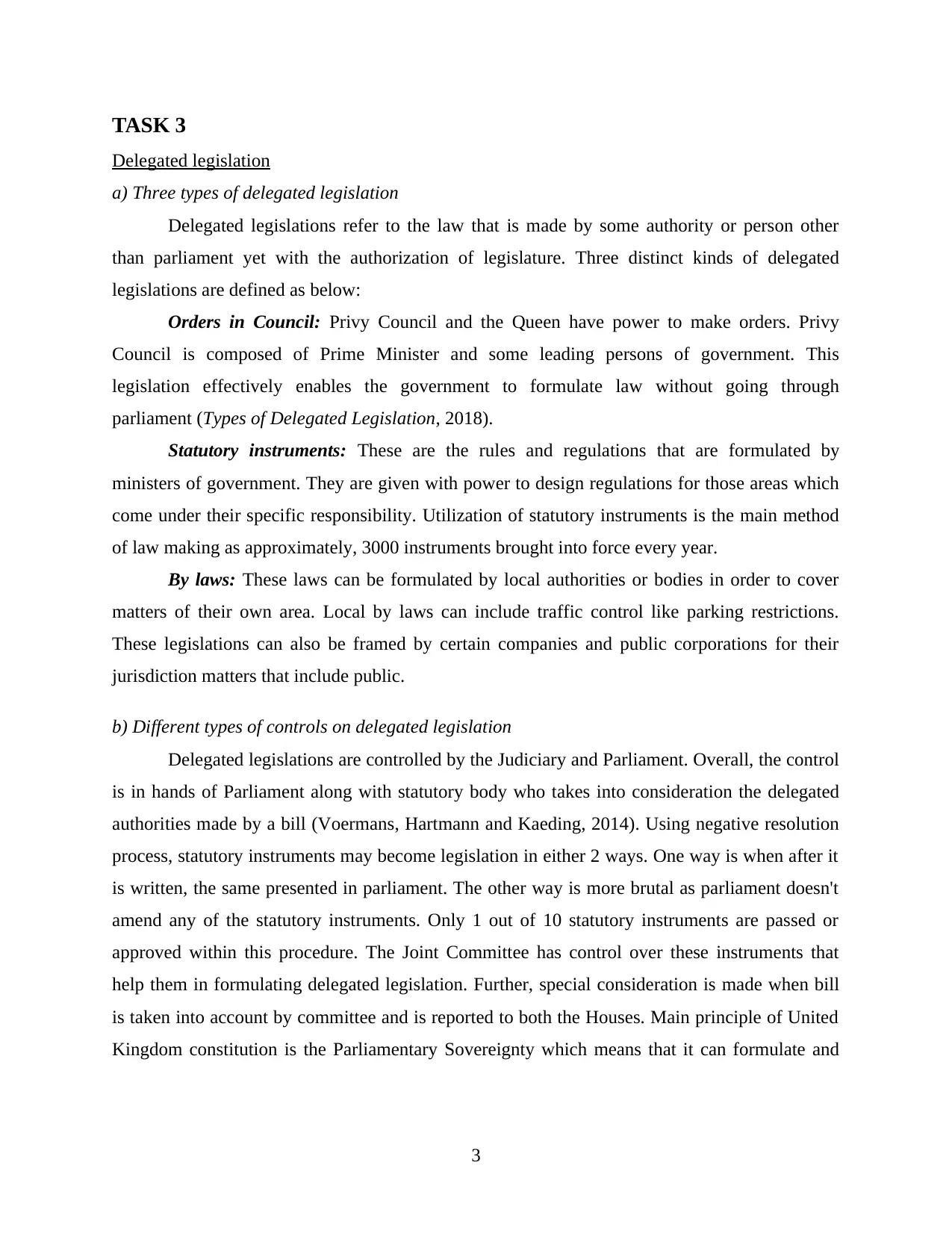
TASK 3
Delegated legislation
a) Three types of delegated legislation
Delegated legislations refer to the law that is made by some authority or person other
than parliament yet with the authorization of legislature. Three distinct kinds of delegated
legislations are defined as below:
Orders in Council: Privy Council and the Queen have power to make orders. Privy
Council is composed of Prime Minister and some leading persons of government. This
legislation effectively enables the government to formulate law without going through
parliament (Types of Delegated Legislation, 2018).
Statutory instruments: These are the rules and regulations that are formulated by
ministers of government. They are given with power to design regulations for those areas which
come under their specific responsibility. Utilization of statutory instruments is the main method
of law making as approximately, 3000 instruments brought into force every year.
By laws: These laws can be formulated by local authorities or bodies in order to cover
matters of their own area. Local by laws can include traffic control like parking restrictions.
These legislations can also be framed by certain companies and public corporations for their
jurisdiction matters that include public.
b) Different types of controls on delegated legislation
Delegated legislations are controlled by the Judiciary and Parliament. Overall, the control
is in hands of Parliament along with statutory body who takes into consideration the delegated
authorities made by a bill (Voermans, Hartmann and Kaeding, 2014). Using negative resolution
process, statutory instruments may become legislation in either 2 ways. One way is when after it
is written, the same presented in parliament. The other way is more brutal as parliament doesn't
amend any of the statutory instruments. Only 1 out of 10 statutory instruments are passed or
approved within this procedure. The Joint Committee has control over these instruments that
help them in formulating delegated legislation. Further, special consideration is made when bill
is taken into account by committee and is reported to both the Houses. Main principle of United
Kingdom constitution is the Parliamentary Sovereignty which means that it can formulate and
3
Delegated legislation
a) Three types of delegated legislation
Delegated legislations refer to the law that is made by some authority or person other
than parliament yet with the authorization of legislature. Three distinct kinds of delegated
legislations are defined as below:
Orders in Council: Privy Council and the Queen have power to make orders. Privy
Council is composed of Prime Minister and some leading persons of government. This
legislation effectively enables the government to formulate law without going through
parliament (Types of Delegated Legislation, 2018).
Statutory instruments: These are the rules and regulations that are formulated by
ministers of government. They are given with power to design regulations for those areas which
come under their specific responsibility. Utilization of statutory instruments is the main method
of law making as approximately, 3000 instruments brought into force every year.
By laws: These laws can be formulated by local authorities or bodies in order to cover
matters of their own area. Local by laws can include traffic control like parking restrictions.
These legislations can also be framed by certain companies and public corporations for their
jurisdiction matters that include public.
b) Different types of controls on delegated legislation
Delegated legislations are controlled by the Judiciary and Parliament. Overall, the control
is in hands of Parliament along with statutory body who takes into consideration the delegated
authorities made by a bill (Voermans, Hartmann and Kaeding, 2014). Using negative resolution
process, statutory instruments may become legislation in either 2 ways. One way is when after it
is written, the same presented in parliament. The other way is more brutal as parliament doesn't
amend any of the statutory instruments. Only 1 out of 10 statutory instruments are passed or
approved within this procedure. The Joint Committee has control over these instruments that
help them in formulating delegated legislation. Further, special consideration is made when bill
is taken into account by committee and is reported to both the Houses. Main principle of United
Kingdom constitution is the Parliamentary Sovereignty which means that it can formulate and
3
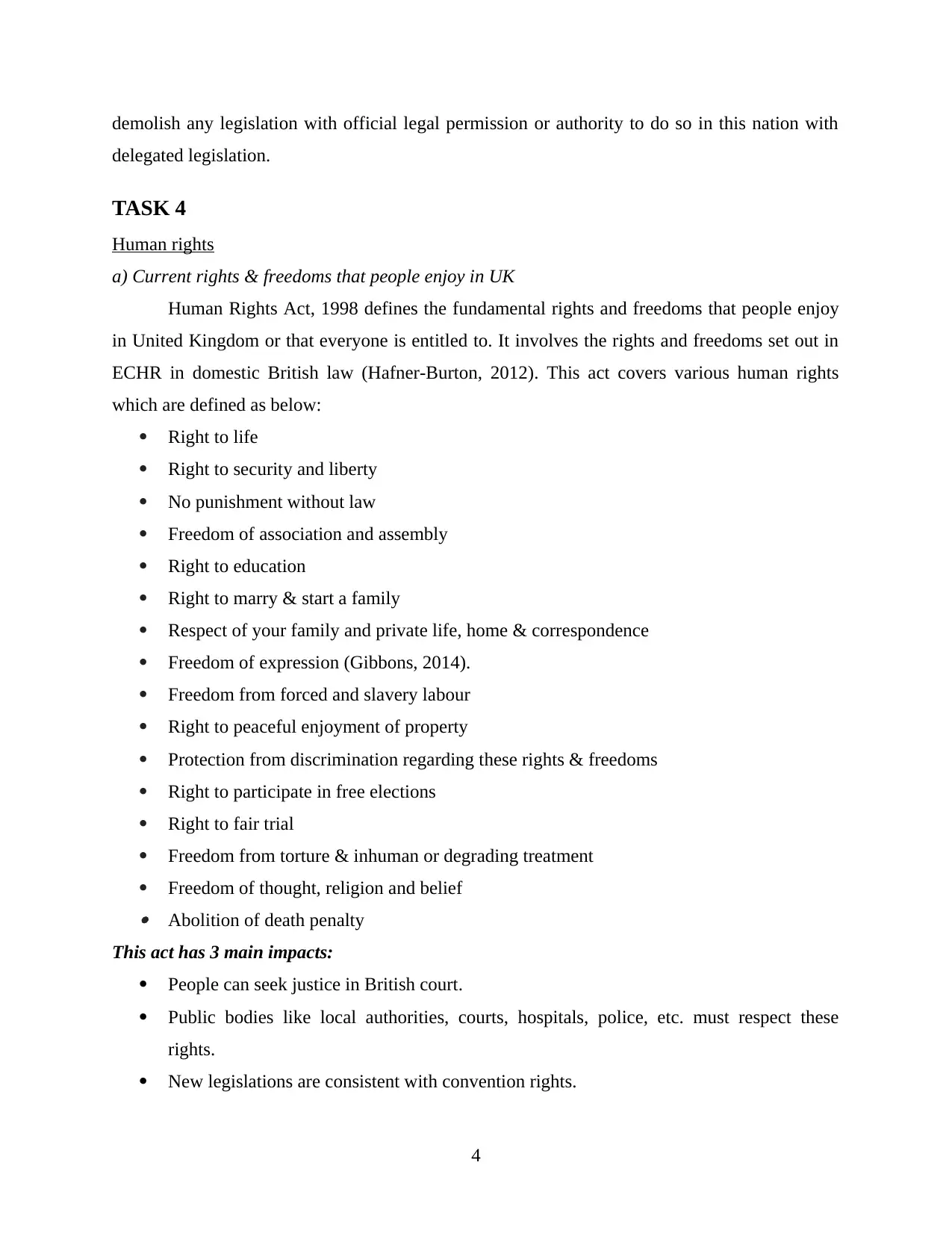
demolish any legislation with official legal permission or authority to do so in this nation with
delegated legislation.
TASK 4
Human rights
a) Current rights & freedoms that people enjoy in UK
Human Rights Act, 1998 defines the fundamental rights and freedoms that people enjoy
in United Kingdom or that everyone is entitled to. It involves the rights and freedoms set out in
ECHR in domestic British law (Hafner-Burton, 2012). This act covers various human rights
which are defined as below:
Right to life
Right to security and liberty
No punishment without law
Freedom of association and assembly
Right to education
Right to marry & start a family
Respect of your family and private life, home & correspondence
Freedom of expression (Gibbons, 2014).
Freedom from forced and slavery labour
Right to peaceful enjoyment of property
Protection from discrimination regarding these rights & freedoms
Right to participate in free elections
Right to fair trial
Freedom from torture & inhuman or degrading treatment
Freedom of thought, religion and belief Abolition of death penalty
This act has 3 main impacts:
People can seek justice in British court.
Public bodies like local authorities, courts, hospitals, police, etc. must respect these
rights.
New legislations are consistent with convention rights.
4
delegated legislation.
TASK 4
Human rights
a) Current rights & freedoms that people enjoy in UK
Human Rights Act, 1998 defines the fundamental rights and freedoms that people enjoy
in United Kingdom or that everyone is entitled to. It involves the rights and freedoms set out in
ECHR in domestic British law (Hafner-Burton, 2012). This act covers various human rights
which are defined as below:
Right to life
Right to security and liberty
No punishment without law
Freedom of association and assembly
Right to education
Right to marry & start a family
Respect of your family and private life, home & correspondence
Freedom of expression (Gibbons, 2014).
Freedom from forced and slavery labour
Right to peaceful enjoyment of property
Protection from discrimination regarding these rights & freedoms
Right to participate in free elections
Right to fair trial
Freedom from torture & inhuman or degrading treatment
Freedom of thought, religion and belief Abolition of death penalty
This act has 3 main impacts:
People can seek justice in British court.
Public bodies like local authorities, courts, hospitals, police, etc. must respect these
rights.
New legislations are consistent with convention rights.
4
⊘ This is a preview!⊘
Do you want full access?
Subscribe today to unlock all pages.

Trusted by 1+ million students worldwide
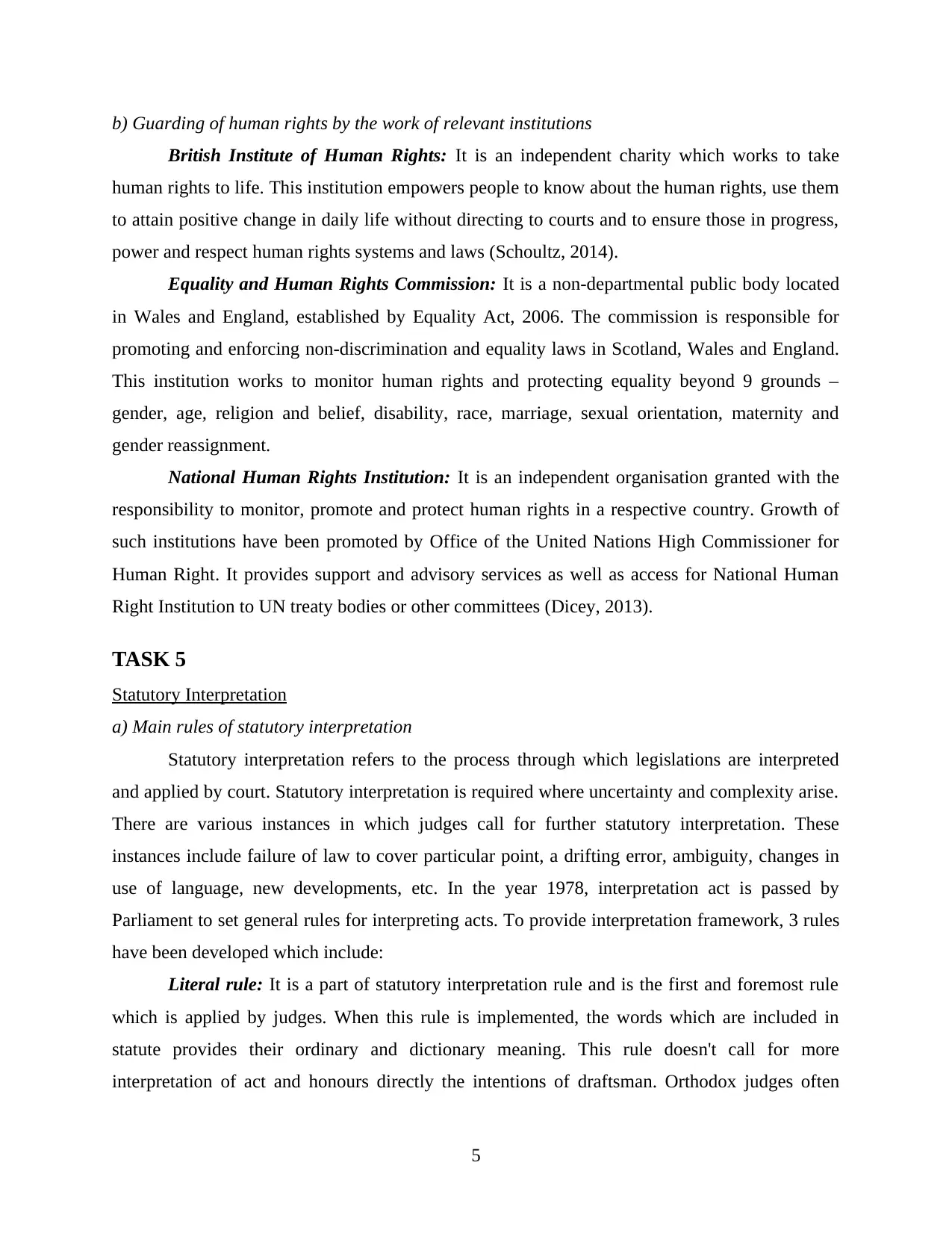
b) Guarding of human rights by the work of relevant institutions
British Institute of Human Rights: It is an independent charity which works to take
human rights to life. This institution empowers people to know about the human rights, use them
to attain positive change in daily life without directing to courts and to ensure those in progress,
power and respect human rights systems and laws (Schoultz, 2014).
Equality and Human Rights Commission: It is a non-departmental public body located
in Wales and England, established by Equality Act, 2006. The commission is responsible for
promoting and enforcing non-discrimination and equality laws in Scotland, Wales and England.
This institution works to monitor human rights and protecting equality beyond 9 grounds –
gender, age, religion and belief, disability, race, marriage, sexual orientation, maternity and
gender reassignment.
National Human Rights Institution: It is an independent organisation granted with the
responsibility to monitor, promote and protect human rights in a respective country. Growth of
such institutions have been promoted by Office of the United Nations High Commissioner for
Human Right. It provides support and advisory services as well as access for National Human
Right Institution to UN treaty bodies or other committees (Dicey, 2013).
TASK 5
Statutory Interpretation
a) Main rules of statutory interpretation
Statutory interpretation refers to the process through which legislations are interpreted
and applied by court. Statutory interpretation is required where uncertainty and complexity arise.
There are various instances in which judges call for further statutory interpretation. These
instances include failure of law to cover particular point, a drifting error, ambiguity, changes in
use of language, new developments, etc. In the year 1978, interpretation act is passed by
Parliament to set general rules for interpreting acts. To provide interpretation framework, 3 rules
have been developed which include:
Literal rule: It is a part of statutory interpretation rule and is the first and foremost rule
which is applied by judges. When this rule is implemented, the words which are included in
statute provides their ordinary and dictionary meaning. This rule doesn't call for more
interpretation of act and honours directly the intentions of draftsman. Orthodox judges often
5
British Institute of Human Rights: It is an independent charity which works to take
human rights to life. This institution empowers people to know about the human rights, use them
to attain positive change in daily life without directing to courts and to ensure those in progress,
power and respect human rights systems and laws (Schoultz, 2014).
Equality and Human Rights Commission: It is a non-departmental public body located
in Wales and England, established by Equality Act, 2006. The commission is responsible for
promoting and enforcing non-discrimination and equality laws in Scotland, Wales and England.
This institution works to monitor human rights and protecting equality beyond 9 grounds –
gender, age, religion and belief, disability, race, marriage, sexual orientation, maternity and
gender reassignment.
National Human Rights Institution: It is an independent organisation granted with the
responsibility to monitor, promote and protect human rights in a respective country. Growth of
such institutions have been promoted by Office of the United Nations High Commissioner for
Human Right. It provides support and advisory services as well as access for National Human
Right Institution to UN treaty bodies or other committees (Dicey, 2013).
TASK 5
Statutory Interpretation
a) Main rules of statutory interpretation
Statutory interpretation refers to the process through which legislations are interpreted
and applied by court. Statutory interpretation is required where uncertainty and complexity arise.
There are various instances in which judges call for further statutory interpretation. These
instances include failure of law to cover particular point, a drifting error, ambiguity, changes in
use of language, new developments, etc. In the year 1978, interpretation act is passed by
Parliament to set general rules for interpreting acts. To provide interpretation framework, 3 rules
have been developed which include:
Literal rule: It is a part of statutory interpretation rule and is the first and foremost rule
which is applied by judges. When this rule is implemented, the words which are included in
statute provides their ordinary and dictionary meaning. This rule doesn't call for more
interpretation of act and honours directly the intentions of draftsman. Orthodox judges often
5
Paraphrase This Document
Need a fresh take? Get an instant paraphrase of this document with our AI Paraphraser
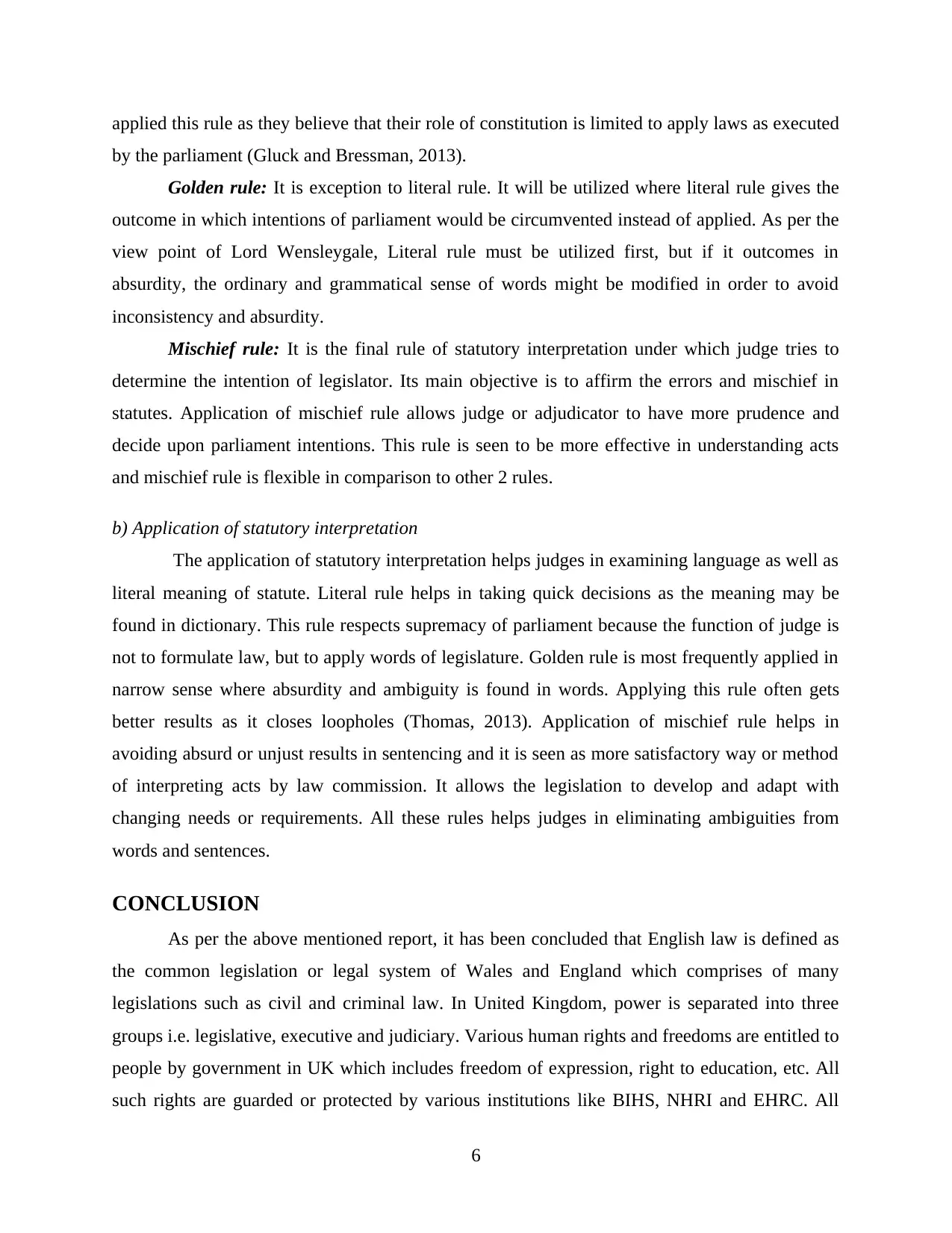
applied this rule as they believe that their role of constitution is limited to apply laws as executed
by the parliament (Gluck and Bressman, 2013).
Golden rule: It is exception to literal rule. It will be utilized where literal rule gives the
outcome in which intentions of parliament would be circumvented instead of applied. As per the
view point of Lord Wensleygale, Literal rule must be utilized first, but if it outcomes in
absurdity, the ordinary and grammatical sense of words might be modified in order to avoid
inconsistency and absurdity.
Mischief rule: It is the final rule of statutory interpretation under which judge tries to
determine the intention of legislator. Its main objective is to affirm the errors and mischief in
statutes. Application of mischief rule allows judge or adjudicator to have more prudence and
decide upon parliament intentions. This rule is seen to be more effective in understanding acts
and mischief rule is flexible in comparison to other 2 rules.
b) Application of statutory interpretation
The application of statutory interpretation helps judges in examining language as well as
literal meaning of statute. Literal rule helps in taking quick decisions as the meaning may be
found in dictionary. This rule respects supremacy of parliament because the function of judge is
not to formulate law, but to apply words of legislature. Golden rule is most frequently applied in
narrow sense where absurdity and ambiguity is found in words. Applying this rule often gets
better results as it closes loopholes (Thomas, 2013). Application of mischief rule helps in
avoiding absurd or unjust results in sentencing and it is seen as more satisfactory way or method
of interpreting acts by law commission. It allows the legislation to develop and adapt with
changing needs or requirements. All these rules helps judges in eliminating ambiguities from
words and sentences.
CONCLUSION
As per the above mentioned report, it has been concluded that English law is defined as
the common legislation or legal system of Wales and England which comprises of many
legislations such as civil and criminal law. In United Kingdom, power is separated into three
groups i.e. legislative, executive and judiciary. Various human rights and freedoms are entitled to
people by government in UK which includes freedom of expression, right to education, etc. All
such rights are guarded or protected by various institutions like BIHS, NHRI and EHRC. All
6
by the parliament (Gluck and Bressman, 2013).
Golden rule: It is exception to literal rule. It will be utilized where literal rule gives the
outcome in which intentions of parliament would be circumvented instead of applied. As per the
view point of Lord Wensleygale, Literal rule must be utilized first, but if it outcomes in
absurdity, the ordinary and grammatical sense of words might be modified in order to avoid
inconsistency and absurdity.
Mischief rule: It is the final rule of statutory interpretation under which judge tries to
determine the intention of legislator. Its main objective is to affirm the errors and mischief in
statutes. Application of mischief rule allows judge or adjudicator to have more prudence and
decide upon parliament intentions. This rule is seen to be more effective in understanding acts
and mischief rule is flexible in comparison to other 2 rules.
b) Application of statutory interpretation
The application of statutory interpretation helps judges in examining language as well as
literal meaning of statute. Literal rule helps in taking quick decisions as the meaning may be
found in dictionary. This rule respects supremacy of parliament because the function of judge is
not to formulate law, but to apply words of legislature. Golden rule is most frequently applied in
narrow sense where absurdity and ambiguity is found in words. Applying this rule often gets
better results as it closes loopholes (Thomas, 2013). Application of mischief rule helps in
avoiding absurd or unjust results in sentencing and it is seen as more satisfactory way or method
of interpreting acts by law commission. It allows the legislation to develop and adapt with
changing needs or requirements. All these rules helps judges in eliminating ambiguities from
words and sentences.
CONCLUSION
As per the above mentioned report, it has been concluded that English law is defined as
the common legislation or legal system of Wales and England which comprises of many
legislations such as civil and criminal law. In United Kingdom, power is separated into three
groups i.e. legislative, executive and judiciary. Various human rights and freedoms are entitled to
people by government in UK which includes freedom of expression, right to education, etc. All
such rights are guarded or protected by various institutions like BIHS, NHRI and EHRC. All
6

these organisations work to monitor, protect and promote human rights. Statutory interpretation
includes three rules i.e. literal, golden and mischief which helps judges in removing absurdities
found in words and sentences.
7
includes three rules i.e. literal, golden and mischief which helps judges in removing absurdities
found in words and sentences.
7
⊘ This is a preview!⊘
Do you want full access?
Subscribe today to unlock all pages.

Trusted by 1+ million students worldwide
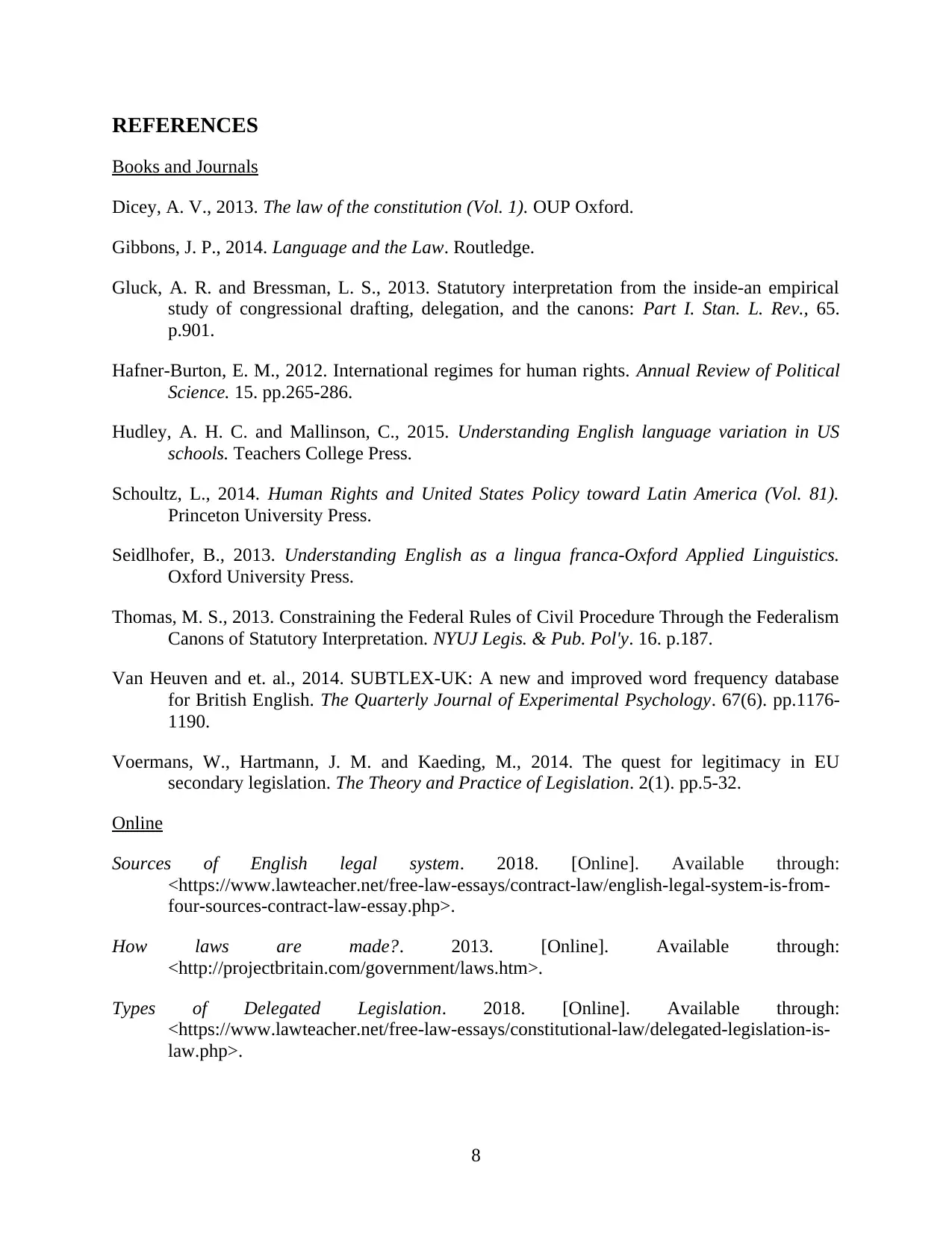
REFERENCES
Books and Journals
Dicey, A. V., 2013. The law of the constitution (Vol. 1). OUP Oxford.
Gibbons, J. P., 2014. Language and the Law. Routledge.
Gluck, A. R. and Bressman, L. S., 2013. Statutory interpretation from the inside-an empirical
study of congressional drafting, delegation, and the canons: Part I. Stan. L. Rev., 65.
p.901.
Hafner-Burton, E. M., 2012. International regimes for human rights. Annual Review of Political
Science. 15. pp.265-286.
Hudley, A. H. C. and Mallinson, C., 2015. Understanding English language variation in US
schools. Teachers College Press.
Schoultz, L., 2014. Human Rights and United States Policy toward Latin America (Vol. 81).
Princeton University Press.
Seidlhofer, B., 2013. Understanding English as a lingua franca-Oxford Applied Linguistics.
Oxford University Press.
Thomas, M. S., 2013. Constraining the Federal Rules of Civil Procedure Through the Federalism
Canons of Statutory Interpretation. NYUJ Legis. & Pub. Pol'y. 16. p.187.
Van Heuven and et. al., 2014. SUBTLEX-UK: A new and improved word frequency database
for British English. The Quarterly Journal of Experimental Psychology. 67(6). pp.1176-
1190.
Voermans, W., Hartmann, J. M. and Kaeding, M., 2014. The quest for legitimacy in EU
secondary legislation. The Theory and Practice of Legislation. 2(1). pp.5-32.
Online
Sources of English legal system. 2018. [Online]. Available through:
<https://www.lawteacher.net/free-law-essays/contract-law/english-legal-system-is-from-
four-sources-contract-law-essay.php>.
How laws are made?. 2013. [Online]. Available through:
<http://projectbritain.com/government/laws.htm>.
Types of Delegated Legislation. 2018. [Online]. Available through:
<https://www.lawteacher.net/free-law-essays/constitutional-law/delegated-legislation-is-
law.php>.
8
Books and Journals
Dicey, A. V., 2013. The law of the constitution (Vol. 1). OUP Oxford.
Gibbons, J. P., 2014. Language and the Law. Routledge.
Gluck, A. R. and Bressman, L. S., 2013. Statutory interpretation from the inside-an empirical
study of congressional drafting, delegation, and the canons: Part I. Stan. L. Rev., 65.
p.901.
Hafner-Burton, E. M., 2012. International regimes for human rights. Annual Review of Political
Science. 15. pp.265-286.
Hudley, A. H. C. and Mallinson, C., 2015. Understanding English language variation in US
schools. Teachers College Press.
Schoultz, L., 2014. Human Rights and United States Policy toward Latin America (Vol. 81).
Princeton University Press.
Seidlhofer, B., 2013. Understanding English as a lingua franca-Oxford Applied Linguistics.
Oxford University Press.
Thomas, M. S., 2013. Constraining the Federal Rules of Civil Procedure Through the Federalism
Canons of Statutory Interpretation. NYUJ Legis. & Pub. Pol'y. 16. p.187.
Van Heuven and et. al., 2014. SUBTLEX-UK: A new and improved word frequency database
for British English. The Quarterly Journal of Experimental Psychology. 67(6). pp.1176-
1190.
Voermans, W., Hartmann, J. M. and Kaeding, M., 2014. The quest for legitimacy in EU
secondary legislation. The Theory and Practice of Legislation. 2(1). pp.5-32.
Online
Sources of English legal system. 2018. [Online]. Available through:
<https://www.lawteacher.net/free-law-essays/contract-law/english-legal-system-is-from-
four-sources-contract-law-essay.php>.
How laws are made?. 2013. [Online]. Available through:
<http://projectbritain.com/government/laws.htm>.
Types of Delegated Legislation. 2018. [Online]. Available through:
<https://www.lawteacher.net/free-law-essays/constitutional-law/delegated-legislation-is-
law.php>.
8
1 out of 10
Related Documents
Your All-in-One AI-Powered Toolkit for Academic Success.
+13062052269
info@desklib.com
Available 24*7 on WhatsApp / Email
![[object Object]](/_next/static/media/star-bottom.7253800d.svg)
Unlock your academic potential
Copyright © 2020–2026 A2Z Services. All Rights Reserved. Developed and managed by ZUCOL.




